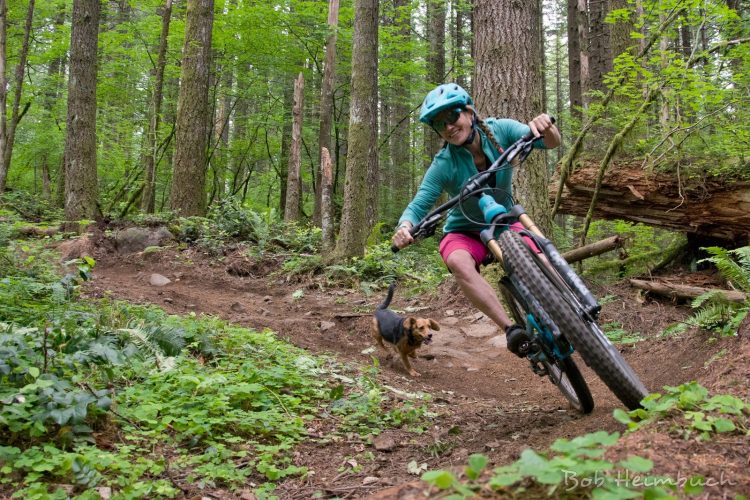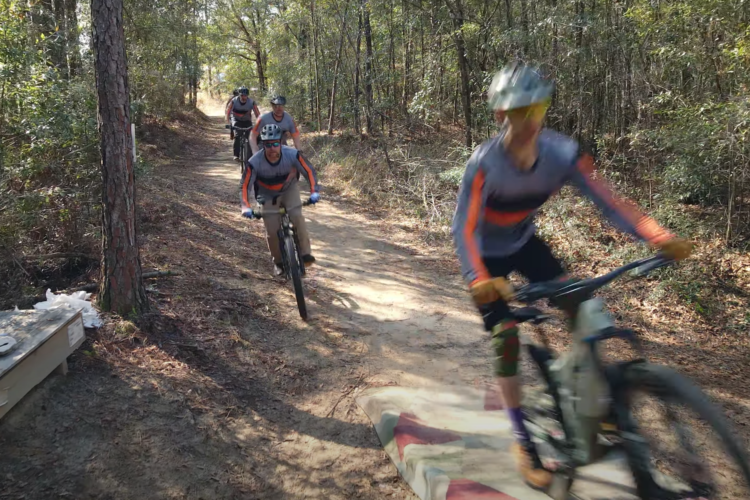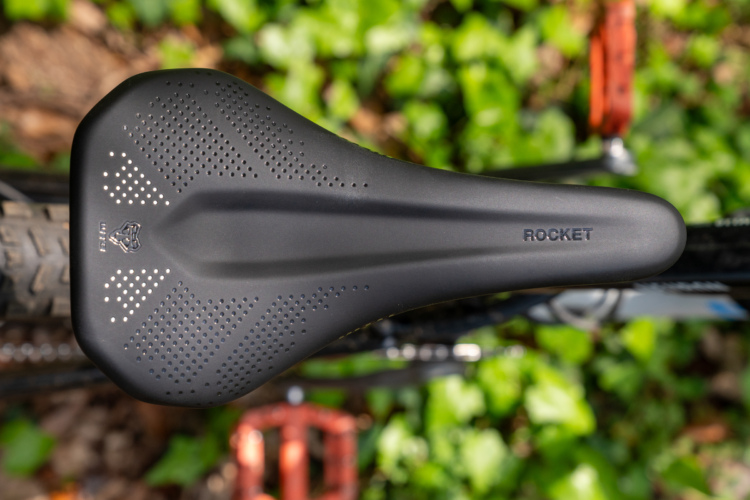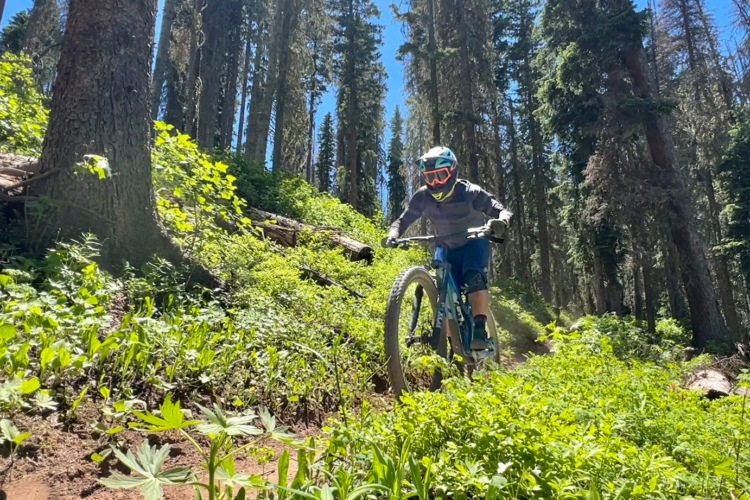I can honestly say that I rode legal, purpose-built singletrack within the city limits of Atlanta. Very soon, you will be able to do the same. A date for the party and ribbon cutting has yet to be set, as there are a few punch list items to complete, but it’s so close you can taste the dirt.

Although the length of this trail is short–1.25 miles for Phase 1–the tale of this trail, and where it can lead, is long. It’s a tale of partnerships, planning, patience, and persistence. SORBA Atlanta began working with the City of Atlanta to build trails Inside the Perimeter (ITP) over 10 years ago, culminating in singletrack multi-use trails included in the Beecher Hills Lionel Hampton Nature Preserve Conceptual Master Plan, in November 2006.
Wheels turned–Atlanta Mayor Shirley Franklin held a press conference at the park, the Atlanta Bicycle Campaign supplied seed money for design work, IMBA Trail Solutions (ITS) walked the property and created a preliminary trail design. Hopes were high, progress was progressing–until it wasn’t. The project came to a halt when trail construction on City of Atlanta Department of Watershed land that bordered Lionel Hampton Park became untenable.
But, Atlanta DPR did want mountain biking in the city, so they offered SORBA Atlanta the Southside Sports Complex, a facility with softball fields, paved parking lot, bathrooms, and even showers, along with 200 acres of undeveloped forest. A kickoff meeting, attended by staff from DPR, the Atlanta Bicycle Campaign, IMBA Trail Solutions, and SORBA, was held at the park in the summer of 2013. DPR was ready to move forward and invest in quality trail construction and an engaging mountain bike experience.
Concerns that Atlanta’s protective tree ordinance, that requires trees over a certain diameter be replaced, would make the cost of construction prohibitive, were met with assurances from the City of Atlanta staff. Doug Voss, Director, Office of Parks, said the ordinance is not a problem in regards to singletrack trail construction, as the city has created trails in their parks before, and small saplings, dead or dying trees, and invasive species are not considered when assessing the impact of construction on trees.

Voss requested a scope of service from ITS that included design documents and a list of costs. The final proposal from ITS would be a turnkey cost, broken into phases.
- Phase 1: included walking the property, developing a design for the trail, flagging the trail, and walking the flagged trail with a City arborist so that the arborist could determine the impact to the trees on the property.
- Phase 2: included a detailed design and list of costs that included input from the arborist, as well as erosion control and other such guidelines that the City set forth.
- Phase 3: included construction of the trail. Volunteers would not be used during construction.
Rebecca Serna, Executive Director of Atlanta Bicycle Coalition, agreed to act as facilitator for the project and would define the City’s Scope of Work, an official request to engage ITS for the Phase 1 work on the project, that described the tasks and deliverables expected from ITS.
ITS sent Alex Harrington to Atlanta, in the fall, after the leaves were gone, to survey the land and design and flag the trail corridor. Harrington delivered a Conceptual Trail Design Report, a corridor map, and budget at the end of December 2013. A meeting was held at the Office of Parks on Peachtree Road, and Harrington joined in by phone conference. Questions were asked, answered, and Harrington arranged to meet City Arborist Chris Kallio to walk the property and discuss tree impact.

Harrington and Kallio walked the flagged corridor; Kallio prepared and delivered his report, which, at first glance, appeared daunting. SORBA Atlanta President, Brett Davidson, wondered, “Holy shit! How’s this ever gonna happen?” The project didn’t die at this point, although there were rumors to this effect, but it did slow down.
Because providing natural surface multi-use trails for mountain biking is a new endeavor for the City, SORBA Atlanta determined to make the City staff, elected officials, Commission appointees and community members as educated about trails as possible. Former Georgia Trails Specialist and principal of Be Ready Trails, Walt Bready, held a workshop on recreational trails that included sustainable building practices and how to meet user expectations. Bready’s workshop was well-attended, well-received, and showed the chapter’s commitment to trail education and partnerships.
While waiting to hear how to move forward regarding tree ordinance compliance, Atlanta SORBA sought help from Park Pride. Park Pride is a non-profit that works with Atlanta communities to improve their parks by partnering with Friends of Parks groups. From the Park Pride website,
“Officially forming a Friends of the Park group will have many intangible benefits, such as giving neighbors an opportunity to meet and interact, and creating a single unified voice for the park. However, there are also many tangible benefits that a Friends group can take advantage of once registered with Park Pride, including access to:
- Park Visioning Program
- Park Pride Grants
- Fiscal Partners Program
- Park Play Library
- Park Toolshed
- Organized volunteer workdays with Park Pride’s Volunteer Manager and more!”
Southside Park had no Friends of Park group, but it does now.
Working with Park Pride and forming Friends of Southside Park showed SORBA Atlanta a way forward. The City had suggested hiring a third party arborist to look at Atlanta’s tree ordinance and ITS’s trail design. Park Pride suggested that the chapter use David Dechant of Arborguard. Dechant is well-known and respected, having worked on the Atlanta Botanical Garden Canopy Walk and other environmentally sensitive construction projects. Says Davidson, “David Deschant was the right person to hire.”
Starting in 2015, Deschant created a tree inventory for the Phase 1 trail construction area. Each tree was identified, and those over a certain size were dog-tagged with a number. A map of trees with a list of their type and condition was created, along with the impact from construction. Thousands of impacted trees became a few, as Arborguard defined negative tree impact as removal of the tree, not riding bikes over the roots. Davidson had secured a $25,000 grant from REI, and some of those funds were used to hire Arborguard. “The impact data that we’ve gathered, and will gather going forward, is a great resource. We can track how our trees are impacted over time. Atlanta and other cities can see how purpose-built, multi-use trails benefit and preserve the forest canopy,” says Davidson.

Arborguard and SORBA Atlanta presented their findings to the City. Soon after, Chris Kallio and the Atlanta Tree Commission signed off on the plan. A sign was posted on the property at the end of May 2016, and the public comment period was officially opened. Once comment closed, no objections had been lodged, so construction could begin.
Following Alex Harrington’s weather-beaten hand-tied flags as a guide, Brett Davidson, Walt Bready, Ethan Quehl, and TJ Kearns pin-flagged the trail. The group flagged an easy, flowing, family- and beginner-friendly trail. The City officials walked the proposed route, and approved it promptly.
Ken Nix and Walt Bready were hired to construct the trail, and they broke ground on May 23rd, 2016. All but the finishing work was completed by June 16th. I rode the trail on June 29th, and the tread was sweet! Finishing work on the tread, sign installation, dead tree removal, and some trash cleanup were all that remained to be done.
Whew. Thanks for staying with me, readers. The trail is built, and it’s a fun little trail, named Evergreen. The City will decide upon a date for the Grand Opening, and you’re all invited to the party!
“We are so excited to see this trail become real. We’re planning the opening festivities, and we’re planning the next two phases, which will see the addition of an intermediate and advanced loop. Poole Creek has to have a boardwalk and bridge built over it before we can start trailbuilding. We’ll need to do some serious fundraising for that project. But we’ll get there, and when we’re done, we’ll have seven miles of mountain bike trails inside the Perimeter, inside the Atlanta City limits, right in the shadow of the World’s Busiest Airport,” said Davidson.





















2 Comments
Jul 22, 2016
Jul 18, 2016